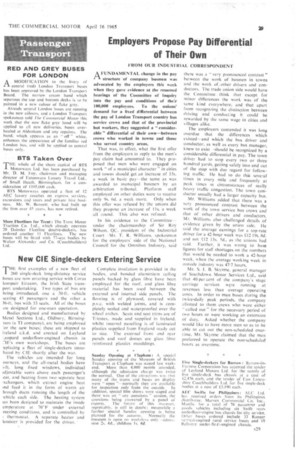Employers Propose Pay Differential of Their Own
Page 31

If you've noticed an error in this article please click here to report it so we can fix it.
FROM OUR INDUSTRIAL CORRESPONDENT
J\FUNDAMENTAL change in the pay structure of company busmen wits advocated by the employers this week when they gave evidence at the resumed hearings of the Cotnmittee of Inquiry into the pay and conditions of their 100,000 employees. To the unions' demand for a fixed ,differential between the pay of London Transport country bus service crews and that of the provincial hut workers, they suggested a "considerable" differential of their own—between crews who worked in towns and those who served country areas.
That was, in effect, what the first offer from the employers in reply to the men's pay claim had amounted to. They proposed that men who were engaged on work "of a municipal character" in cities and towns should get an increase of 15s. a week in basic pay—the same as was awarded to municipal busmen by an arbitration tribunal. Platform staff employed on other duties were to receive only 9s. tid. a week inure. Only when this offer was refused by the unions did they propose an increase of Ifs. a week all round. This also was refused.
In his evidence to the Committee— under the chairmanship of Sir Roy Wilson, QC, president of the Industrial Court Mr. T. R. Williams. spokesman for the employers' side of the National Council for the Omnibus Industry, said
there was a " very pronounced contrast" between the work of busmen in towns and the work of.other drivers and conductors. The trade union side would have the Committee think that except for minor differences the work was of the same kind everywhere, and that apart from recognizing the distinction between. striving and conduct;ng it could be rewarded by the same wage in cities and villages alike.
The •employers contended it was long overdue that the . differences .which existed—and which the bus driver and conductor, as well as every bus manager, knew to exist -should be recognized by a considerable differential in pay. The town driver had to stop every two or three hundred yards. getting safely into and out of the stop with due regard for following traffic. He had to do this several times in every Mile and frequently at peak times in circumstances of really heavy traffic congestion. The town conductor usually had a larger capacity bus. Mr. Williams added that there was a very pronounced contrast between the work of the town service bus crews and that of other drivers and conductors: Mr. Williams also challenged details of evidence given by the union side. He said the average earnings for a top-rate driver for a 42-hour week was 12 19s. 8d. and not £12 13s. 5d., as the unions had said. Further, it was wrong to base figures for staff shortages on the numbers that would be needed to work a 42-hour week, when the average working week in outside industry was 47-7 hours.
Mr. S. .1. B. Skyrtne. general manager of Southdown Motor Services Ltd., said that 40 per cent of the company's stage carriage services were running at revenues less than .average operating costs. In order to man buses during the twice-daily peak periods, the company allotted to them crews who were either " called out " for the necessary period of two hours or were working an extension of duty. Asked whether the company would like to have more men so as to be able to cut out the non-scheduled overtime, Mr. Skyrme claimed that the men preferred to operate the non-scheduled hours as overtime. .




















































































































